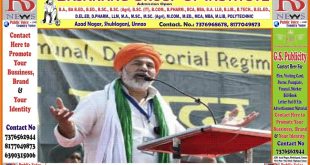SC On Places Of Worship Act: A bench of Chief Justice of India (CJI) Sanjiv Khanna and Justice Sanjay Kumar heard petitions challenging the Protection of Places of Worship Act, 1991. The court upheld the stay granted in the last hearing and refused to issue notice on new petitions. However, the petitioners were allowed to file applications.
Meanwhile, Jamiat Ulama-e-Hind President Maulana Arshad Madani said on today’s legal action that the decision to maintain the stay is very important as it will stop the provocative activities of communal forces. He said that this is an extremely sensitive and important matter as the unity and brotherhood of the country can be protected only by the existence of this law.
‘The decision in the Babri case was accepted with a heavy heart’
He further said that the communal forces have once again exposed their violent intentions, and the situation has worsened due to the irresponsible decisions given by the lower courts in such cases. Maulana Madani said that we had accepted the decision in the Babri Masjid case with a heavy heart, thinking that now there will be no dispute over the temple-mosque and an atmosphere of peace and brotherhood will be created in the country, but our belief proved wrong.
The silent approval of the ruling parties gave the communal forces an opportunity to become active again and they targeted our places of worship at many places, bypassing the supremacy of the Constitution and the law. Maulana Madani said that this serious situation has put all the justice-loving citizens across the country in deep worry, but the people in power are silent as if this is not an issue for them.
The Central Government did not respond
The Supreme Court said that first the process of filing all the petitions should be completed, after that the Central Government will file an affidavit on them together. The court made it clear that any issue has a limit, which the court will decide. Therefore, notice will not be given on new petitions. Now a three-member bench will hear this matter in the first week of April.
Despite the Supreme Court’s direction, the Central Government has not yet filed its affidavit. The petitioners expressed displeasure over this. The court said that all the petitions should be filed together first, then the government should submit a comprehensive affidavit
Jamiat Ulama-e-Hind’s stand
Advocate on record Ejaz Maqbool presented a summary of all the petitions, which was accepted by the CJI. Maulana Arshad Madani expressed satisfaction over the court’s decision and said that the decision to maintain the stay is important, as it will prevent communal provocation. He expressed concern that if this law is removed, the security of any religious place will not be ensured.
What is this matter?
Under the Protection of Places of Worship Act, 1991, the nature of any religious place cannot be changed after 15 August 1947. Challenging this law, the petitioners have demanded that it be declared unconstitutional. Jamiat Ulama-e-Hind and other Muslim organizations have filed petitions to protect the law.
Communal tension and the role of the government
Maulana Arshad Madani alleged that the government’s inaction has encouraged communal forces. He said that peace was expected by considering the Babri Masjid dispute as over, but the temple-mosque dispute is being raised again.
 RB News World Latest News
RB News World Latest News






